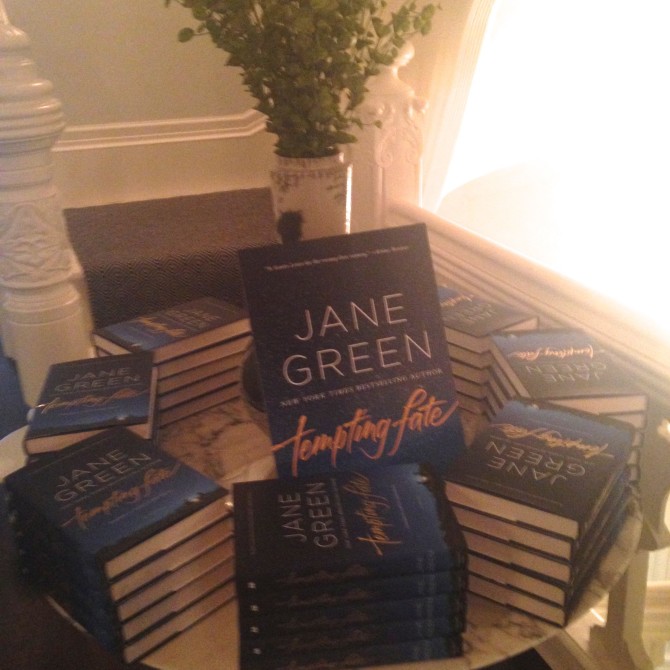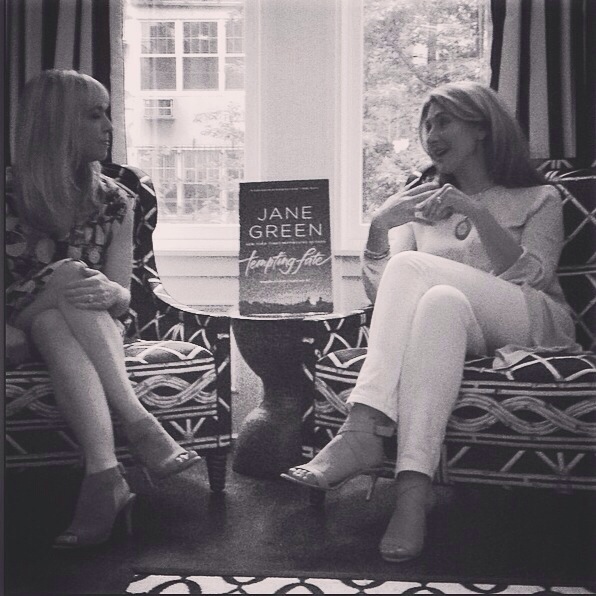11 Insights from Jane Green
On Wednesday evening, I hosted a Happier Hour literary salon here with bestselling author Jane Green. Oh what a night. It was a packed house and we jammed in my yellow living room and talked about marriage and infidelity, twin themes of the Jane's latest novel Tempting Fate.
In the book, Jane's protagonist Gabby, a woman who is forty-three and happily married, faces temptation in the form of a younger, attractive, solicitous man. An intriguing premise no doubt, one that forces us to ask: Why do married people stray and particularly happily married people? This was just one of the many questions we all considered together over the course of the evening that also included juicy celebrity stories and inspiring writing tips. It is so difficult to boil the ineffable magic of these nights into one a single post and yet I feel compelled to try. Behold, a list of some of the bits I took away from Jane. And please note: These are only my interpretations of what Jane said!
1. The Grass Is Never Greener.
People often have affairs because they believe the grass is greener, that a new and exciting relationship will be far better than a seasoned and predictable one, but that's not the way it works. Often, people have affairs with “soul mates” only to watch those "fated" relationships fizzle and lead to regret. Jane told a powerful story about a woman sacrificing her marriage to have an affair with an art teacher, only to later realize that her jilted husband was indeed the love of her life. It is perhaps human nature to want what others have, to wonder about lives other than our own - particularly in this age of social media - but it is vital to realize and remember that actually switching things up might not make us happier at all.
2. The Grass Is Greener Where We Water It.
An important caveat or footnote to the above. Marriage, like other important relationships, requires our attention and thoughtful care. If we want our own grass to stay a happy shade of green, we must water it. Anything that is neglected for too long will die.
3. Writing Is a Muscle.
Writing is a muscle and we must exercise it every day. Oh how I believe this. I notice that when I am writing every day, my writing gets stronger and clearer. When I take too much time off, my skills atrophy and my words and stories suffer.
4. Discipline Is Huge.
Jane has published fifteen(!) bestselling novels while raising five(!) children. As someone who is struggling to finish her second book while raising three little ones, I asked how she does it and, trust me, I listened intently. She said that it all comes down to discipline. Writing is her job and she treats it as such. She sits down each day – with her noise-cancelling headphones, her classical music, and her coffee and she will not get up until the words are written. She sets herself a hefty daily production quota. These days it’s 5000 words(!)
5. We Must Let Go of Results.
Jane spoke candidly about her many successes as well as her self-admitted slump. She said that she has learned over the years to write the best book she can and not concern herself too much with metrics (total book sales, number on the bestseller list). I think this is so important, but also a very challenging thing to do, right?
6. Forget About Audience.
Similar to #5. Someone asked a wonderful question about whether Jane thinks of her audience while she’s crafting a book and Jane said no, that she writes the book she wants to write and does not concern herself at this early point with how her story will be received. Again, something to strive for!
8. There Are Indeed Perks.
Jane opened the evening by telling some delicious celebrity stories. She talked about cooking Hugh Grant lunch in Notting Hill and flying in a helicopter with Harrison Ford. Note to self: become a wildly bestselling author and these kinds of opportunities might present themselves :)
9. Every Novel Must Ask 3 Questions.
(1) What does she want?; (2) Why can't she have it?; (3) How is she going to get it? {Oh do I love this!}
10. Inspiration Is Everywhere.
Jane spoke compellingly about inspiration. About how it's everywhere. A wonderful example: She and her husband would take long late night walks on the beach in Westport, Connecticut and every night at the same time, they'd pass a woman in her sixties with long white hair and red lipstick on a bicycle who was smoking a cigarette. This woman became a protagonist of one of her books.
11. Marriage Is Boring.
At a certain point, after years and kids and the emergence of routines, "marriage becomes pots and pans." It's not that we become boring or our partners become boring, but the relationship itself, the arrangement, will invariably lose that sparkly excitement that comes with novelty. This is not necessarily a bad thing, but a very real thing, and we shouldn't expect otherwise. I think this is so important. When we marry, we quite literally settle down. We fashion routines and rhythms and expectations. We choose to do these things and as far as I'm concerned there is something wonderful about doing these things. But we cannot also bemoan the fact that our lives include less surprise and less spontaneity than they once did. It should be noted that Jane said she is very happily married. (I got to meet her dashing hubby at the end of the evening!)
 There was so much more we talked about and touched on, but this list will have to do. Thank you so much, Jane, for being here with all of us. I encourage all of you to read Tempting Fate and then to check out Jane's earlier works.
There was so much more we talked about and touched on, but this list will have to do. Thank you so much, Jane, for being here with all of us. I encourage all of you to read Tempting Fate and then to check out Jane's earlier works.

